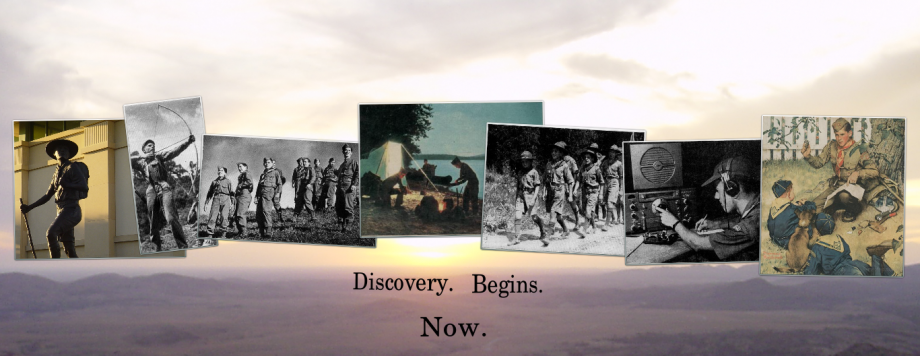After a short break from posts here on Scouting Rediscovered, I’d like to pick back up with a post on a very important Scout skill: Survival. The post is a bit lengthy, but I think it will be well worth your time and attention. If you have a subject that you would like to see covered here on Scouting Rediscovered, please leave a comment and let me know! Thanks for reading!
___________________________________________________
Perhaps you’ve seen Bear Gryll’s Man vs. Wild or Les Stroud’s Survivorman. The success of these TV shows have demostrated the general public’s fascination with survival skills; the basic struggle of a man to survive amid adverse situations. While most people see these shows as a sort of magic act, where the survivor is a magician performing mysterious tricks; a Scout looks upon these skills as basic must-know information.
Just as magic tricks look simple once explained to the audience, so survival skills follow basic principles that aren’t difficult to learn. However, just as good magicians must practice their tricks many times in order to perfect them, so the survivalist must not simply know ‘how’ to survive, he must have the skills to survive. And these skills take practice to acquire.
In this post, I’m going to share with you the five basic principles of survival, which I learned from the “Tom Brown’s Field Guide” series. This will help you to be prepared to survive by giving you the knowledge you need. It is up to you to practice the skills needed to be a true survivalist.
Why?

A Scout knows how to not only survive, but make himself comfortable apart from civilization.
In today’s world of advanced technology, a Scout may never have to use basic, primitive survival skills, yet the true Scout learns them by heart anyway. Why is this? Well, one of the simplest reasons is that technology can fail or be absent. Though not necessarily common, this happens more often than you might expect.
As I write this, Hurricane Isaac is bearing down upon the Louisiana coast. If nothing else, this serves as a grim reminder of Hurricane Katrina which wreaked its havoc almost 7 years ago to the day. This disaster brought about the deaths of over one thousand people and rendered many years of advanced technology useless. It happened before, it can happen again, and it is the duty of the Scout to be prepared for this.
Another reason that the Scout learns these basic survival skills is what it does inside of him. When a Scout knows that he can survive without any of the comforts of civilization, it gives him a confidence that can’t be gained any other way. Baden-Powell, the founder of the Scouting Movement, put it excellently in his book, Scouting for Boys:
‘Very few fellows learn these things when they are living in civilized places, because they have comfortable houses, and soft beds to sleep in. Their food is prepared for them, and when they want to know the way, they just ask a policeman.
Well, when those fellows try to go scouting or exploring, they find themselves quite helpless.
Take even your sports “hero” and put him down in the wilderness, alongside a fellow trained in camping, and see which can look after himself. High batting averages are not much good to him there. He is only a “tenderfoot”. “
It Starts with the Mind
I want to start by emphasizing the most important requirement of survival: a survivalist mental state and the will to survive. When someone is suddenly thrown into a survival situation, one of their first reactions is to panic, especially someone who doesn’t have any training. This panic instinct is very detrimental to survival and is responsible for so many needless deaths.
The twin to panic is despair. Despair is what happens when somebody looses the will to live. They think there is no possible way to survive, and this fear paralyses them. Survival in a primitive situation is a fight, an it must be looked upon as such. It will need all of the strength, courage, and fortitude that you can muster.
1. Air
It is said that you can live “four minutes without air, four days without water, and forty days without food.” To start with, air is the number one priority in a survival situation. This might seem obvious, like “don’t drown if you want to survive”, but there is more to it than that. This category includes all of first aid and personal health as well. For instance, knowing CPR is a must when trying to help others survive. Also, thought must be given to the blood which carries the air (or oxygen) throughout your body. You must know how to treat wounds and perform first aid for a variety of injuries.
In a hypothetical situation, suppose you were canoeing down the Colorado River one afternoon, when, out in the middle of nowhere, you hit some bad rapids. You try to weather them, but your canoe strikes a rock hidden below the surface and you get overturned. The water is moving so quickly and is so rough that you are constantly being dunked and tossed around. The water throws you against a sharp rock and you get an ugly gash in your arm.
Your first priority is to make your way to the shore and secure yourself again the possibility of drowning. Secondly, you must deal with the gash in your arm. If you started off toward civilization immediately, you wouldn’t get very far. You must first secure yourself against physical injuries.
2. Shelter
The next priority in a survival situation is Shelter. Most people today are used to some form of climate control and live in places with plenty of shelter. This results in our bodies not having built up a natural acclimatization to more extreme temperatures. Death by exposure is one of the most common fatalities among those who are stranded in a survival situation. As Tom Brown explains, “Even a minor drop in body temperature can so adversely affect the brain that it no longer functions well enough to make survival decisions.” This shelter can include clothing and a structure to protect you from the elements.
In the hypothetical situation I started earlier, the next step would be to find some place to shelter. Even in areas that you think have a hotter climate, the temperature can still drop very low at night. In the hypothetical situation, you also have the disadvantage of being dunked in water. This wouldn’t be a problem while the sun is still out, but after it goes away and the water starts to evaporate off your skin and clothing, it will cool you down very quickly. Using what you know about the principles of insulation and building survival shelters, you set to work and finish just before the sun starts to set.

If you’re surviving on a nifty little raft like this one, then water isn’t a huge worry for you. In most real survival situations, however, water is one of the top priorities.
3. Water
Water is our lifeblood. Just one day without water will start to diminish our thinking and decision-making ability. It therefore follows that water is next on the survival priority list. There are many different techniques that can be used to obtain and purify water, but I don’t have the time to go into them now. Let me suffice to say that there is a lot to learn on this subject. Water must be found, it must be in a safe place, it must be collected, filtered, and disinfected.
Obtaining water can be one of the most difficult challenges to the survivalist, as there are many places where fresh lakes and streams are not readily accessible. In addition, water must be made safe to drink, especially these days. Something as small as getting mildly sick from drinking bad water can spell the difference between life and death in a survival situation. One of the most common ways to purify water is by boiling, which brings us to number four.

Fire is one of the most important survival tools; it is useful for so many things.
4. Fire
In situations where frostbite and hypothermia are a significant danger, fire might be higher up on this list of priorities. Among its many uses, keeping us warm is one of the most critical. The reason it only makes number four on this list is because there are times when you can get by without it, and it can be a luxury rather than a necessity. On the other hand, it is one of the most important resources to the survivalist because of its many uses.
Fire can be made from electricity, lighters, matches, sparks, compression, or friction. It is important that a Scout is thoroughly familiar with all of these methods. Striking the flame, however, is only half the battle. Knowing how to structure the fire and prepare its fuel is also vital to know. Fire can be used to warm someone, purify water, make tools, and cook food. Hey, speaking of which, what about food?
5. Food
Food falls last on the list of the Big Five. This might surprise you, but it is important to know that food can be done without for quite a bit longer than the other things on this list. Since the other things on this list are so readily available in everyday life, we tend to take them for granted, no matter how important they are.
If you are going to have to survive for more than two days or so, then you need to start considering what you will eat, but only after the other items have been taken care of. If you immediately start looking for something to eat and overlook securing the other items on this list first, then you are making a grave mistake.
Getting food in a survival situation falls into two categories: gathering edible plants, and hunting/trapping wild animals. Both require knowledge and practice to get good at.
Conclusion
So, in summary, there are five main priorities when in a survival situation. In order of importance, these are: Air, Shelter, Water, Fire, and Food. There might be times and circumstances where the order of importance of these priorities changes a little, but this will not be the norm.
Thanks for reading this post! Do you have any comments, thoughts, or questions? I’d love to hear them! What do you do to prepare yourself for survival?
I want this to get out to as many Scouts as possible, so please help by sharing this post. You can easily share this on Facebook, Twitter, and etc. by clicking the little icons below this post.
Thanks again! Scout on, my friends!











 Today, I’m going to continue the series I
Today, I’m going to continue the series I 